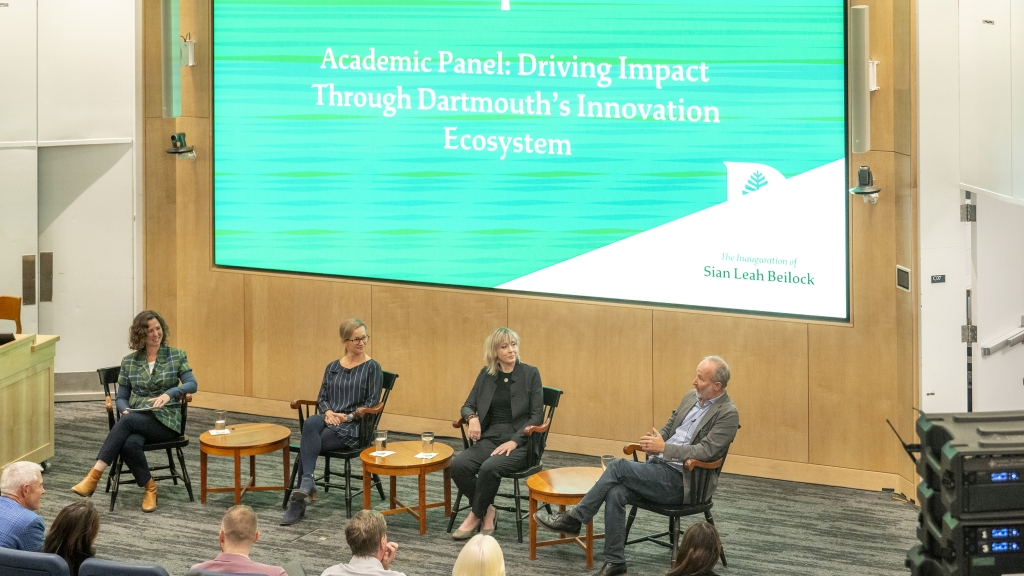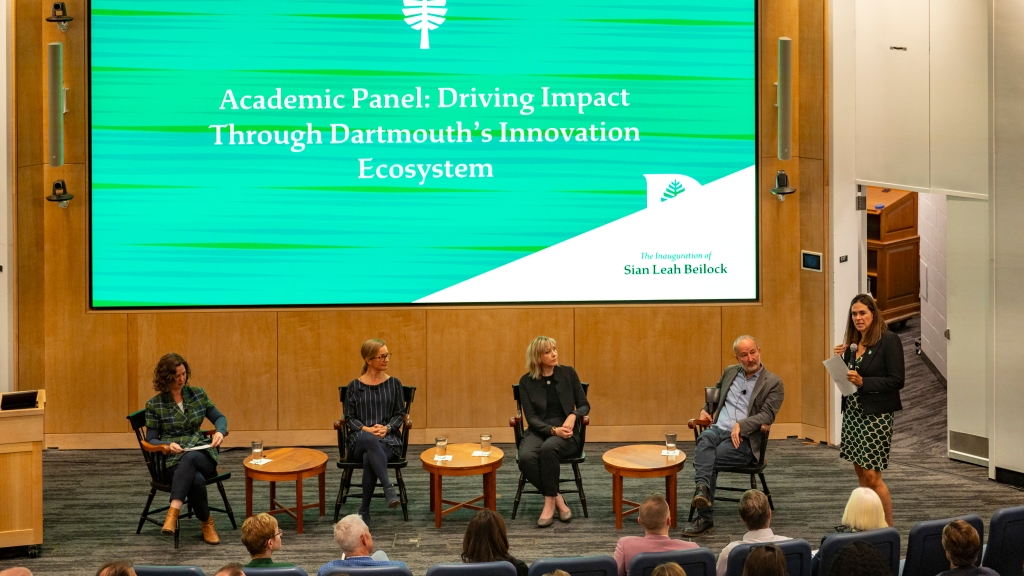Groundbreaking professors from across Dartmouth discussed the institution's ability to make an impact through innovation during a panel in Cook Auditorium Thursday evening.
The hourlong conversation was the second in a series of activities celebrating the inauguration of Sian Leah Beilock, Dartmouth's 19th president, who also spoke.
President Beilock said that Dartmouth's size, scale, and collaboration across the undergraduate and professional and graduate schools make it uniquely positioned to translate ideas into impact.
She noted that half of the Thayer School of Engineering faculty have companies, and other faculty members are producing creative novels and plays, "really pushing the boundaries of what impact means."
And, Beilock said, she would be remiss not to mention Buddy Teevens '79, whose pioneering work to reduce full-contact practices and make football safer led to the development at Thayer of a robotic tackling dummy that has been used by multiple college programs and NFL teams.
"As we think about someone who innovated in so many areas of life, I think it's so important to remember Buddy," Beilock said of Teevens, who died on Tuesday following injuries in a bicycle accident.
During the wide-ranging discussion, which was also livestreamed, Mary Flanagan, the Sherman Fairchild Distinguished Professor in Digital Humanities, Tillman Gerngross, professor of engineering, and Daniella Reichstetter, Tuck '07, adjunct professor of business administration, shared their definitions of "innovation," how they measure impact in their work, and their thoughts on the role of universities in supporting innovation.

(Photo by Kata Sasvari)
Flanagan, a renowned artist and game designer, said that for her, innovation starts with asking unexpected questions.
For instance, everyone is familiar with common criticisms of video games, "but what is the power of video games, and how could they be used to do good?" she said. "How can we make a pro-social game? What about a game that encourages recycling?"
For her, measuring impact is "a think tank kind of exploration."
When she's working on games that change minds, such as lowering biases, she and her colleagues conduct social science experiments to assess changes in beliefs, said Flanagan, who directs Tiltfactor research lab. "Then, we try to figure out what design principles led to that, so we can actually describe it to other people so that they can use it in their own work."
Gerngross, an inventor, entrepreneur, and engineer who has founded several successful startups, described the feeling of knowing his work is making a difference in people's lives.
"I cannot tell you the excitement when you run a clinical trial and you actually see the data coming back, and you see this really did something," said Gerngross, whose work in bioengineering has led to innovations contributing to new and improved therapeutics and treatments for disease. "You can just do the numbers and see, well, all of a sudden 3 million people are (being) treated with these drugs."
Gerngross described the support he's had from Dartmouth deans and from alumni who are active in venture capital.
"In my case, they've been extremely helpful in refining my ideas, sharpening them, and then ultimately funding them."
Asked by Thayer Dean Alexis Abramson, who was moderating the discussion, to point to Dartmouth's "secret sauce" for innovation and impact, Reichstetter said size and location play a key role.
"When you're here, you're here, and you can really be deeply involved in whatever you're doing here in a way that's much harder when you take the subway uptown and then take the subway downtown," said Reichstetter, the former executive director of the Tuck Center for Entrepreneurship who now also works on special projects at Tuck.
Reichstetter also referenced Tuck Compass, a new optional program for MBA students that includes a personal board of advisers.
The program reaches beyond academics and career development to focus on personal development and "consider the whole human," she said. "I think that's something that's very Dartmouth-specific."

Engineering professor Tillman Gerngross, right, talks about innovation during the panel in Cook Auditorium. From left are Thayer Dean Alexis Abramson, who was moderating the panel, Tuck professor Daniella Reichstetter, Tuck '07, and digital humanities professor Mary Flanagan. (Photo By Kata Sasvari)
The discussion also highlighted examples from across campus illustrating Dartmouth's innovation and impact ecosystem, including a new course called Entrepreneurship and the Arts, the Climate Solutions Accelerator, the Class of 1982 Engineering and Computer Science Center, the Design Initiative at Dartmouth, and the Magnuson Center for Entrepreneurship.
Later Thursday evening, Beilock gathered with friends, family, and Dartmouth trustees and senior leaders for a dinner in the Hanover Inn ballroom. Attendees included her mother, Ellen, her college roommate, PhD advisers, and former colleagues from the University of Chicago and Barnard.
"Tomorrow at Inauguration I'm going to tell you a lot about my early vision for Dartmouth, which is not just my vision, but a vision of the senior leaders at the institution and so many people we've talked to. But tonight, I just want to say thank you for being here," Beilock said. "It's just wonderful to see so many people together."
The inauguration will culminate Friday with a community cookout on the Tuck Mall at 11:30 a.m., and the ceremony on the Green, at 3 p.m., which will also be livestreamed.
